This article was co-authored by Laura Marusinec, MD. Dr. Marusinec is a board certified Pediatrician at the Children's Hospital of Wisconsin, where she is on the Clinical Practice Council. She received her M.D. from the Medical College of Wisconsin School of Medicine in 1995 and completed her residency at the Medical College of Wisconsin in Pediatrics in 1998. She is a member of the American Medical Writers Association and the Society for Pediatric Urgent Care.
There are 16 references cited in this article, which can be found at the bottom of the page.
wikiHow marks an article as reader-approved once it receives enough positive feedback. In this case, several readers have written to tell us that this article was helpful to them, earning it our reader-approved status.
This article has been viewed 226,461 times.
A bruise happens when you injure the tissues under the top layer of skin without cutting through the skin; your small blood vessels burst, but instead of releasing the blood outside the skin in a cut, it pools underneath it, creating a bruise.[1] Bruises can be painful, and of course you want to stop the pain. You can take some simple steps to help ease the pain, as well as to help the bruise heal faster. You should also know when to call your doctor and how to prevent bruises in the future.
Steps
Dealing with the Pain
-
1Take acetaminophen or ibuprofen.[2] The fastest way to deal with the pain is to take a painkiller such as acetaminophen or ibuprofen. Neither one of these is a blood thinner, which is why they are a good choice with a bruise,[3] and in fact, ibuprofen can help reduce inflammation. A blood thinner, such as aspirin, can increase blood flow, making a bruise worse.[4]
- However, don't stop taking aspirin if you're on an aspirin regimen. Ask your doctor first.[5]
-
2Ice your bruise. Wrap an ice pack or ice cubes (in a zip-top bag) in a towel. Hold it on the bruise for at least 10 minutes. The ice helps reduce the inflammation and swelling, which can lessen pain, but it will also have a numbing effect.[6]
- You can use this treatment three to four times a day, though some professionals note that you can employ this technique once every hour.[7]
- Instead of an ice pack, you can use a bag of frozen vegetables such as peas to ice your bruise. You can refreeze it when you're done, but only use it as an icepack from that point on.[8]
Advertisement -
3Try parsley. Some people claim that parsley can help ease the pain and inflammation of a bruise.[9]
- To use this technique, start with fresh parsley. Crush the leaves with something heavy, such as a pot or a mortar and pestle. Rub the leaves on the bruised area, and use an elastic bandage to hold it in place.
Healing the Bruise
-
1
-
2Get some rest. Try not to overuse the area where you got the bruise. Your tissue needs time to repair itself, and resting can help it do that. Using the muscles too much can cause further damage.[12]
-
3Try St. John's wort. You may have heard that St. John's wort is sometimes used as a natural antidepressant. However, some people also use it to help with bruises because they believe it helps shrink tissues and slow down bleeding.[13]
- To use, apply the oil version of this supplement to your bruise three times a day.
-
4Avoid massaging your bruise. Though it may be tempting to rub your bruise to help it feel better, doing so can actually cause more damage.[14]
-
5Try vitamin K. Like St. John's wort, some people have luck gently applying vitamin K to the bruise because vitamin K helps with clotting. Find the cream version to use on your bruise, and use it twice a day.[15]
-
6Apply arnica. This is often recommended by plastic surgeons to reduce bruising. Try rubbing an arnica cream, ointment, or salve onto the bruised area to reduce inflammation and soothe any aching.
Knowing When to Call the Doctor
-
1Check for the cause. If you are badly bruised or have many bruises but you didn't fall or injure yourself, you should call your doctor. That can be an indication of a more serious problem. It could mean you have a problem with blood clotting or another blood disease.[16]
- If the bruise doesn't improve after two weeks, reach out to your doctor.
-
2Look for signs of infection. One sign of infection is red streaking, where fingers of redness on the skin jut out away from the bruised area. Another symptom is if the bruise is draining something other than blood, such as pus. Also, check to see if you have a fever, as that can be an indicator as well. Call your doctor if you have these symptoms.[17]
- Other signs of infection are if the bruised area gets more swollen, painful, or warm
-
3Feel for pressure. If you feel a great deal of pressure where you are bruised, that is also a reason to call your doctor. It can be a sign of compartment syndrome, a serious condition that slows down circulation in that area.[18] The area may feel very firm or hard and be very painful. See your doctor immediately if the area below the bruise is numb, cold, very pale, or blue.
-
4
Preventing Bruises in the First Place
-
1Check your diet. If you aren't getting the right nutrients, you may end up bruising more easily. Make sure you are eating your fruits and vegetables, as well as whole grains, lean protein, and dairy.[21]
- The main deficiencies that can lead to excessive bruising are vitamins C, K, and B12. Lack of folic acid can also be a problem. These nutrients help your blood clot.
-
2Move obstacles in your house. If your house is especially cluttered, it can lead to you having more injuries. For instance, maybe you always trip over one particular table. Consider moving the table to another area to prevent the problem.[22]
-
3Protect your skin with cloth. Just by wearing long sleeves and pants, you can help protect your skin from minor bruises.[23]
-
4Work on your balance. Bruises often result from falling or klutziness, so by improving your balance, you can decrease your chances of getting a bruise.
- Try weight shifts. Stand with your feet shoulder-width apart. Shift your weight to your right foot. Lift up your left foot. Balance in this position for 30 seconds. Shift to other foot, and hold it for 30 seconds.[24]
- Get physical. That is, even exercises such as walking can help you improve your balance. Try taking a walk everyday to help you increase your balance.
-
5Wear protective gear when playing sports. Take measures to protect yourself when playing sports by wearing the appropriate gear. This may include a helmet, shin or wrist guards, padding, etc.[25]
-
6Talk to your doctor about medications you are taking. Bruising easily is a side effect of some medications, especially blood thinners or heart medicines. Talk to your doctor about switching medicines or what you can do to prevent bruises if you are concerned. However, don't stop any of these medications without talking to your doctor.
-
7Avoid supplements that increase bruising. Fish oil, vitamin E, garlic, ginger, and ginkgo biloba are all supplements that may cause you to bruise easily, especially if you take a blood-thinning medication.[26] Talk to your doctor about alternatives.
References
- ↑ http://kidshealth.org/teen/your_body/skin_stuff/bruises.html
- ↑ https://www.goodrx.com/classes/nsaids/is-it-safe-to-take-tylenol-acetaminophen-with-advil-or-motrin-ibuprofen
- ↑ http://www.nlm.nih.gov/medlineplus/ency/article/007213.htm
- ↑ http://familydoctor.org/familydoctor/en/drugs-procedures-devices/over-the-counter/pain-relievers-understanding-your-otc-options.html
- ↑ https://www.hopkinsmedicine.org/health/wellness-and-prevention/manage-your-medications
- ↑ https://my.clevelandclinic.org/health/diseases/15235-bruises
- ↑ http://www.nlm.nih.gov/medlineplus/ency/article/007213.htm
- ↑ http://kidshealth.org/teen/your_body/skin_stuff/bruises.html#
- ↑ https://www.rxlist.com/parsley/supplements.htm
- ↑ https://my.clevelandclinic.org/health/diseases/15235-bruises
- ↑ http://www.nlm.nih.gov/medlineplus/ency/article/007213.htm
- ↑ http://www.nlm.nih.gov/medlineplus/ency/article/007213.htm
- ↑ https://www.urmc.rochester.edu/encyclopedia/content.aspx?contenttypeid=19&contentid=StJohnsWort
- ↑ https://universityurgent.care/how-to-get-rid-of-bruises/
- ↑ https://pubmed.ncbi.nlm.nih.gov/12140470/
- ↑ https://my.clevelandclinic.org/health/diseases/15235-bruises
- ↑ http://www.nlm.nih.gov/medlineplus/ency/article/007213.htm
- ↑ http://www.nlm.nih.gov/medlineplus/ency/article/007213.htm
- ↑ https://www.rxlist.com/hematoma/drugs-condition.htm
- ↑ http://www.medicinenet.com/hematoma/page2.htm
- ↑ https://www.ncbi.nlm.nih.gov/books/NBK536983/
- ↑ https://my.clevelandclinic.org/health/diseases/15235-bruises
- ↑ https://my.clevelandclinic.org/health/diseases/15235-bruises
- ↑ https://www.nhs.uk/live-well/exercise/strength-and-flexibility-exercises/balance-exercises/
- ↑ http://kidshealth.org/teen/your_body/skin_stuff/bruises.html
- ↑ https://www.goodrx.com/drugs/side-effects/easy-bruising-for-no-reason-medication-side-effect
About This Article
To stop a bruise from hurting, take a painkiller like acetaminophen or ibuprofen, but avoid blood thinners like aspirin, which can make the bruise worse by increasing your blood flow. You can also ice your bruise to reduce swelling and lessen the pain. Wrap an ice pack in a towel, then apply it to your bruise for 10 minutes at a time, 3 to 4 times a day. Additionally, reduce blood flow to your bruise by elevating the area above your heart with a pillow. Be sure to rest and leave your bruise alone, because touching it can cause more damage. However, if you notice an unusual or infected bruise, contact your doctor, since this could be a sign of a more serious problem. For more tips from our Medical co-author, like how to stop a bruise from hurting using fresh parsley, scroll down!
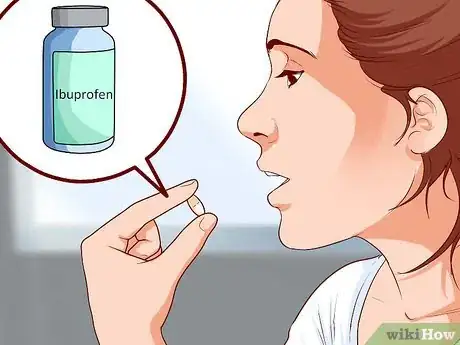
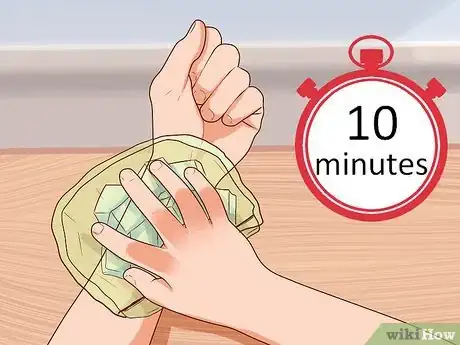
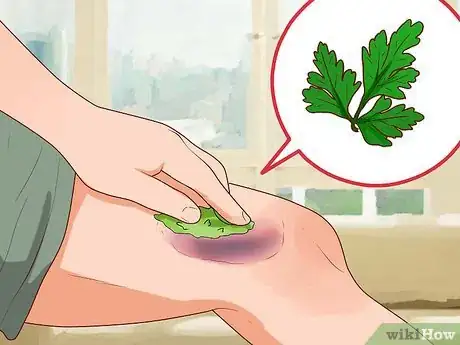
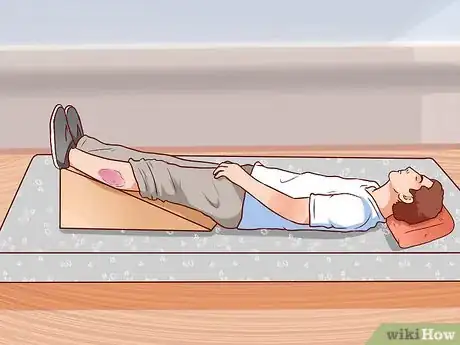
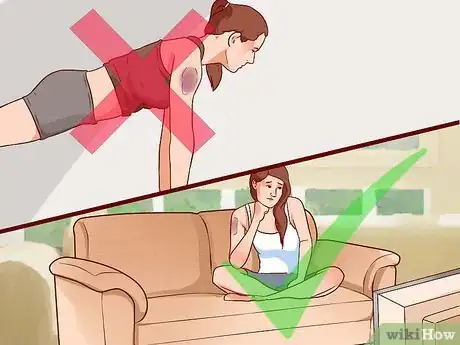
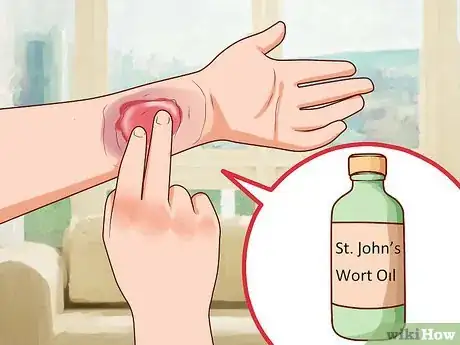
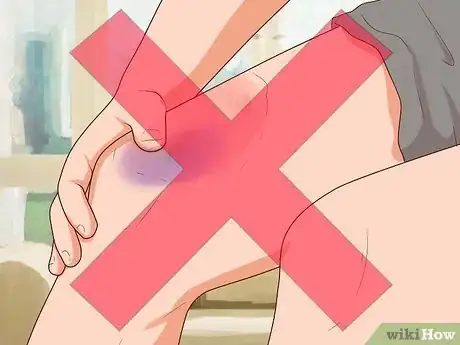
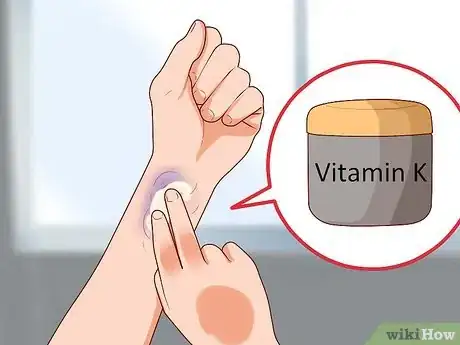
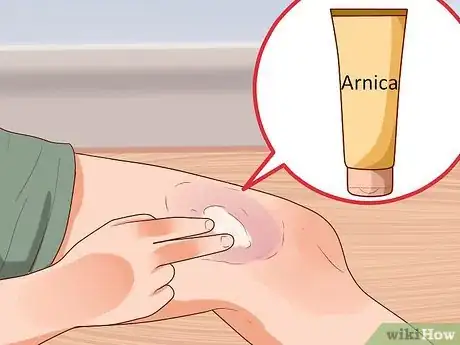
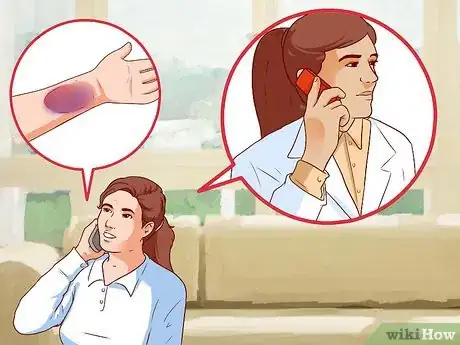
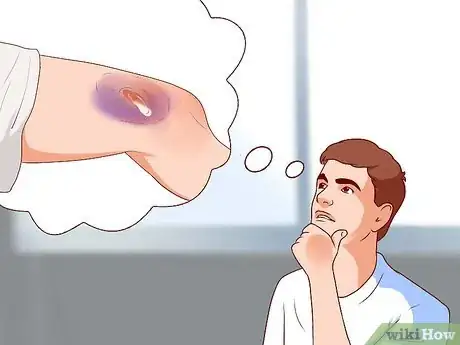
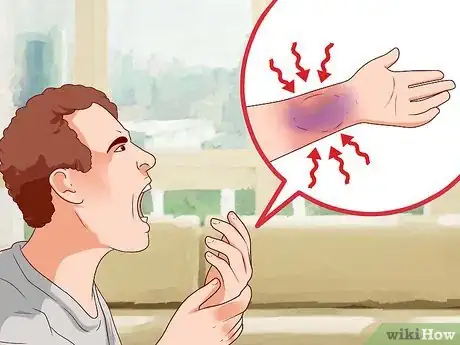
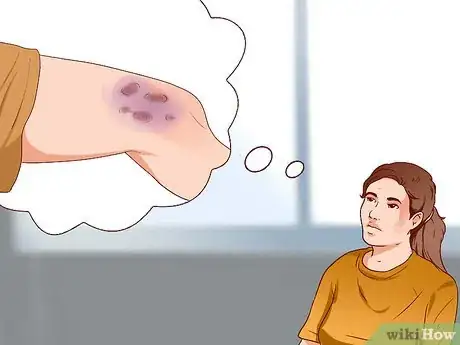

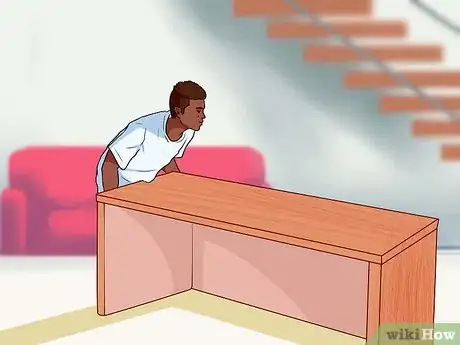
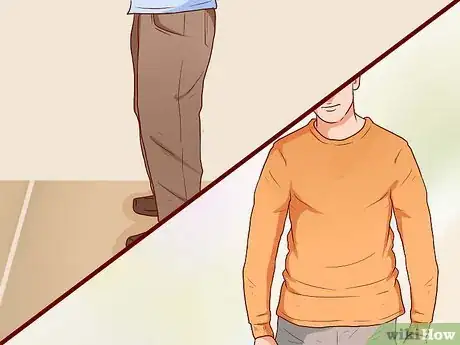

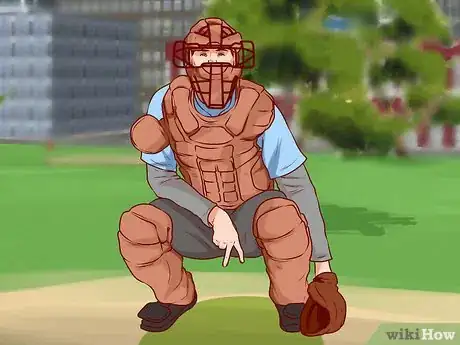
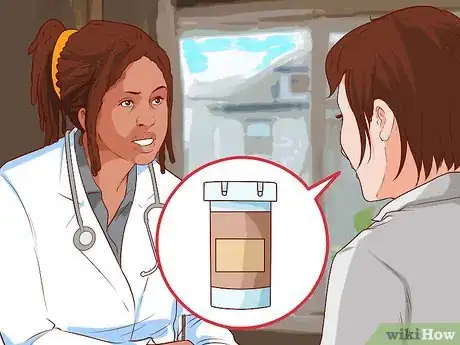
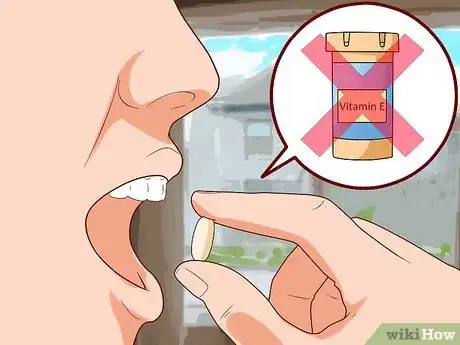

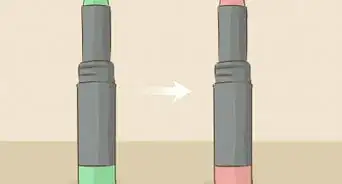



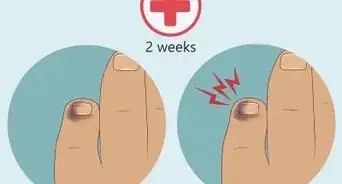

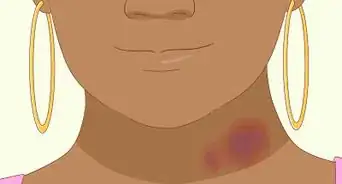



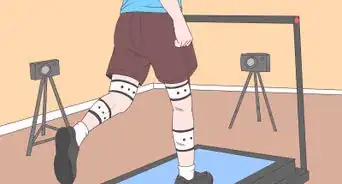
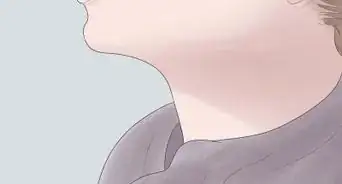
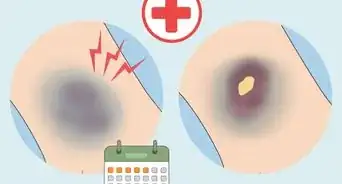













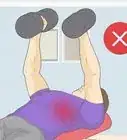



































Medical Disclaimer
The content of this article is not intended to be a substitute for professional medical advice, examination, diagnosis, or treatment. You should always contact your doctor or other qualified healthcare professional before starting, changing, or stopping any kind of health treatment.
Read More...